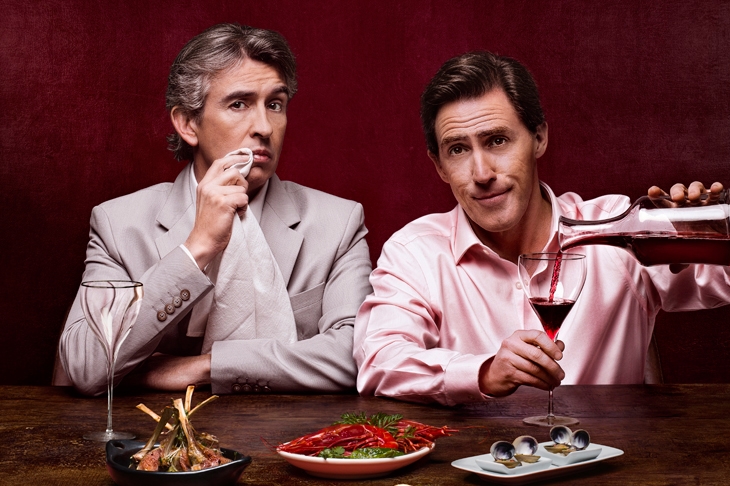Sky Atlantic — available only to Sky customers — has the cunning/infuriating policy of broadcasting the kind of programmes most likely to appeal to people who pride themselves on not being Sky customers. (Basically, the liberal, metropolitan you-know-what.) Now, to a list that includes Veep, Curb Your Enthusiasm, Girls and Last Week Tonight with John Oliver, we can add The Trip, whose third series Sky has poached from the BBC.
Like the first two — set in the Lake District and Italy — The Trip to Spain (Thursday) is directed by Michael Winterbottom and features Rob Brydon and Steve Coogan playing versions of themselves that feel teasingly close to the truth. Brydon is a mostly contented husband and father; Coogan, an anxious autodidact, alternately boasting and fretting about his status in Hollywood.
Once again, the two drive about through lovely scenery, eat at lovely restaurants, prod away at each other’s insecurities and constantly try to top each other’s impersonations — all while just about staying friends. Once again too, they do this with such brilliant and seemingly effortless naturalism that you can sometimes forget how odd the programme is: defiantly slow-paced, bristling with literary references, and blending its comedy with a full-scale meditation on male ageing sharp enough to have earned it some serious scholarly attention. ‘The Trip,’ one critic has written, ‘is more than just an emphatic, self-consciously neo-realist, neo-baroque allegory’ — which is not something you can imagine being said about Mrs Brown’s Boys.
In fact, in the first series since both men turned 50, the theme of age is even more prominent. Without making a great fuss about it, Thursday’s episode forensically laid out several symptoms of fiftysomething male life — starting with Brydon and Coogan’s reliance on a guide book rather than a phone. There was, for example, their determined belief that they’re in their prime, coupled with the not-entirely-suppressed awareness that they might not be for much longer. Their modern cultural references were slightly off, with Brydon at one point appearing to think that amusement arcades still have Space Invaders in them. They told stories they’d forgotten they’d told before. Their jostling for status remained convincingly half-hearted, with the unspoken agreement that Coogan is the alpha male — mainly he’s the one who badly needs to be.
The Trip to Spain, then, already looks like being another unmissable instalment of one of the great TV achievements of the past decade. If only more people weren’t going to miss it.
Ageist bigot that I apparently am, when I heard Dick Clement and Ian La Frenais had written their first new TV sitcom since the 1970s, my reaction was not so much excitement as nervousness. Back then, with Porridge and especially Whatever Happened to the Likely Lads?, they were responsible for two of the best sitcoms of them all. But now, aged 79 and 81 respectively, it seemed at least possible that they might have lost some of their touch.
Fortunately, I needn’t have worried. First episodes of sitcoms are famously difficult to get right, but Henry IX (Gold, Wednesday) managed the neat trick not just of introducing the characters, but of making us feel we’d known them for years — and certainly well enough for the comedy to be instantly character-based. Admittedly, it does help that the script sticks to some familiar sitcom methods, including the one about the characters being essentially trapped (never more literally, of course, than in Porridge). There’s also a recognisable debt to P.G. Wodehouse. Even so, the reference point that springs most readily to mind is Reginald Perrin.
Like Reggie, the protagonist is a middle-aged man who’s always done what’s expected of him, but is now beginning to resent it, and to yearn for change before it’s too late. There is, though, one fairly major twist. The protagonist in question is the British king.
We first saw Henry defying his frankly Jeevesian valet by opting to wear a particularly colourful pair of socks. But after that act of rebellion, his day was mapped out as inflexibly as any of Reggie’s. Finally, after making excruciating small talk with the president of Burkina Faso (‘Have you come far?’ ‘Burkina Faso’), he decided to celebrate his forthcoming Silver Jubilee by abdicating.
In the role of Henry, Charles Edwards does a fine job of making the king’s predicament a sympathetic one — while the supporting cast consists of such sitcom stalwarts as Annette Crosbie, Don Warrington and Sally Phillips. As ever, Clement and La Frenais keep the jokes coming at a good rate, without them ever feeling bunged in. But there’s their usual touch of sadness too. In theory, the cost of following royal protocol should be a rather specific theme. In practice, Henry IX turns it into an allegory — although perhaps not an emphatic, self-consciously neo-realist, neo-baroque one — of middle-aged dutifulness.






Comments